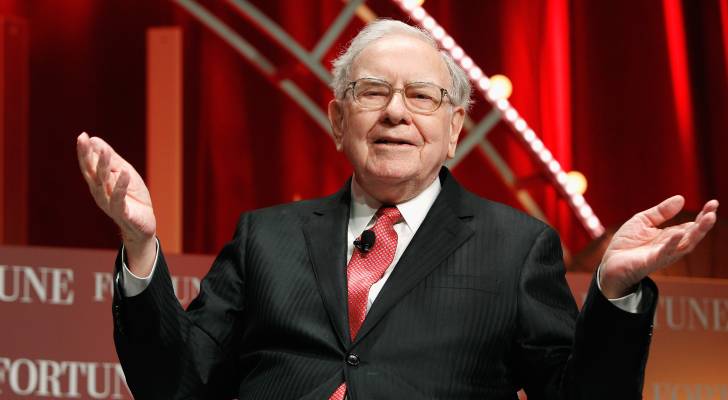
Warren Buffett is well known for his investing talent, as the billionaire got very rich through buying undervalued stocks and holding them for the long term.
It may come as a surprise, however, to learn that Berkshire Hathaway — the multinational conglomerate he runs — held a record $334 billion in cash at the end of last year after selling $134 billion in stocks in 2024, including notable stakes in both Apple and Bank of America, according to CNBC. As of March 31, that amount has increased to $347 billion.
Don’t miss
- I’m 49 years old and have nothing saved for retirement — what should I do? Don’t panic. Here are 5 of the easiest ways you can catch up (and fast)
- You’re probably already overpaying for this 1 ‘must-have’ expense — and thanks to Trump’s tariffs, your monthly bill could soar even higher. Here’s how 2 minutes can protect your wallet right now
- Gain potential quarterly income through this $1B private real estate fund — even if you’re not a millionaire. Here’s how to get started with as little as $10
Buffett amassing a big pile of cash may seem like a smart move in light of the market’s recent performance. After all, throughout history, only former Presidents Richard Nixon and Gerald Ford saw the stock market perform worse during their first 100 days in office than Donald Trump in 2025.
However, while Buffett has so far managed to limit his exposure to recent market volatility, it’s typically not in the best interest of the average investor. Here’s why.
Why over-investing in cash can be a bad idea
Although Buffett kept billions safe from potential loss this year, the Oracle of Omaha made clear that he doesn’t believe cash is king.
"Berkshire will never prefer ownership of cash-equivalent assets over the ownership of good businesses, whether controlled or only partially owned,” he wrote in his 2024 letter to shareholders.
The problem with cash is that your potential return on investment is very limited. Even if you put money into a high-yield savings account or certificate of deposit, it’s unlikely you’ll earn more than 5% annual interest, and it’ll probably be much less. Given that the S&P 500 has consistently produced average annual returns above 10% in its history — despite the volatile nature of the stock market — choosing cash investments cuts your growth potential.
Let’s not forget inflation can siphon the buying power of cash and lower the value of any returns. So, while putting money into cash can make investors feel safer during turbulent times, you might also end up losing ground if inflation is high.
Read more: Want an extra $1,300,000 when you retire? Dave Ramsey says this 7-step plan ‘works every single time’ to kill debt, get rich in America — and that ‘anyone’ can do it
How to decide where to put your money
So, where should your money go instead?
CNBC reported data from J.P. Morgan Asset Management that shows a traditional portfolio with 60% in stocks and 40% in bonds consistently outperforms cash in the long run. This is based on putting 60% of your money into an S&P 500 index fund and 40% into the Bloomberg US Aggregate Bond Index.
From 1995 to 2024, the performance of this 60/40 portfolio would beat cash on a one-month basis 65% of the time. On a six-month basis, it beats cash 75% of the time, and when looking at performance over a year, that number climbs to 80%. Finally, over a time horizon lasting 12 or more years, the 60/40 split portfolio outperformed cash 100% of the time.
A similar 60/40 portfolio also beat out a diversified portfolio of 11 different asset classes during the stock runup in 2024, according to Morningstar research cited by CNBC. The 60/40 portfolio gained 15%, while the diversified portfolio gained only 10%. However, as President Donald Trump‘s trade policies have shaken up the markets, diversified portfolios have so far done better this year, in large part because the price of gold is up more than 30%.
In times of uncertainty, many people feel comforted by holding cash. It may be wise, in such cases, to build up an emergency fund and keep it in a high-yield savings account. But if you already have enough cash socked away for a rainy day, consider putting that money in a portfolio and riding the waves.
Berkshire Hathaway can afford to have billions sitting on the sidelines earning low returns, waiting for an opportune time to make use of their cash. But you don’t have to follow suit, and miss out on potential gains. Even if the market continues to be volatile, a portfolio with a long-term outlook can help weather the storm and put you in a good position for recovery.
What to read next
- Don’t have the cash to pay Uncle Sam in 2025? You may already be eligible for a ‘streamlined’ handshake with the IRS — here’s how it works and how it can potentially save you thousands
- Robert Kiyosaki warns of a ‘Greater Depression’ coming to the US — with millions of Americans going poor. But he says these 2 ‘easy-money’ assets will bring in ‘great wealth’. How to get in now
- Here are 5 ‘must have’ items that Americans (almost) always overpay for — and very quickly regret. How many are hurting you?
This article provides information only and should not be construed as advice. It is provided without warranty of any kind.